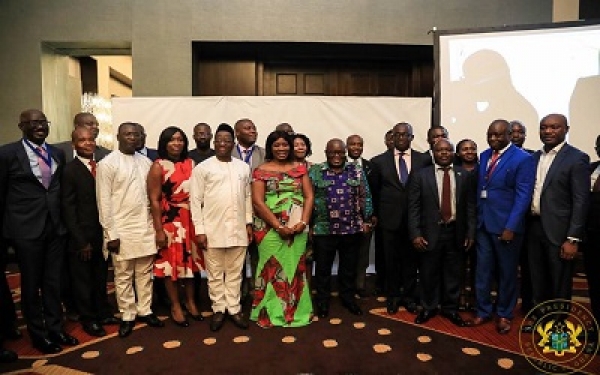PRESIDENT Nana Addo Dankwa Akufo-Addo has assured that his government is following international best practises in the utilisation of oil revenues as well as ensuring that the majority of Ghanaians benefit from revenues accrued from the oil production.
The President averred that countries that have benefited immensely from their oil and gas resources are those that implemented policies to accelerate value addition activities in their economies, through the development of forward and backward linkages, and by investing oil revenues in strategic social and economic programmes.
In pursuant of this, he said, his government has decided to invest oil cash in education and worked out other policies that ensure that oil revenues are used to create assets and not waste it on consumption and the accumulation of debt.
“This is why we are investing revenues from oil in one of the most ambitious social programmes of our country’s history, i.e. the Free Senior High School policy. In the 2018 budget, GH¢455.9 million of petroleum revenues was allocated to the Free SHS programme”.
Speaking at the launch of the “Ghana Oil and Gas Licensing Round 2018”, in Accra yesterday, President Akufo-Addo noted that his government’s decision to invest in Free SHS is to ensure that “our oil revenues are being equitably distributed to our people, and not ending up in the pockets of a few.
“The most important resource of any nation is its people. Investing in our children and in the future of our country is the most appropriate investment any Government can make, and we are fully committed to continuing on this path”, he added.
The President noted that in the quest to increase the country’s reserves and improve on oil and gas production, Cabinet will soon approve a ‘Blueprint and Roadmap for Accelerated Oil and Gas Exploration and Development’, which is based on a new strategy of aggressive exploration.
“The strategy seeks to build synergies with the domestic downstream petroleum sector; to increase Ghanaian participation in the oil industry; and to accelerate the pace of institutional capacity development to manage our oil and gas resources efficiently”, he added.
The President was concerned that with the last discovery and the last exploration well-drilled in 2014, it is obvious that the pace of oil exploration has slowed considerably, a trend which, he said, needed to be reversed immediately, especially in an era where crude oil prices are in the US$70-US$80 per barrel range.
“With the resolution of the maritime boundary dispute with Cote d’Ivoire, and the prevailing, transparent regime for allocating petroleum rights, many opportunities now exist for us to reverse the slow pace of oil exploration”, he noted.
Furthermore, government intends to review critically existing operations in the industry, with the view to determining oil fields that are sub-optimal. The review, according to the President, would cover Petroleum Agreements that are dormant.
“The Ministry of Energy will engage with the operators, after the review, on the adoption of best methods for increasing oil recovery rate. For Petroleum Agreements that are dormant, the Ministry will encourage the operators to consider inviting stronger partners to join them or risk the termination of these Petroleum Agreements, should they persist in failing to meet their minimum work obligations”, the President noted.
He promised government’s commitment to continue to prioritize the development of skills of the youth and the Ghanaian entrepreneur through the AOGC programme, so they can meet international standards, and, thereby, become more competitive in the industry.
“My hope is that more Ghanaian companies will participate in the bidding process”.
The President further charged the Ministry of Energy, the Petroleum Commission, GNPC and the Licensing Rounds Committee, to co-operate to ensure activities under this maiden licensing round are carried out in a transparent and efficient manner.

 President declares and promises transparency to benefit majority of Ghanaians
President declares and promises transparency to benefit majority of Ghanaians

